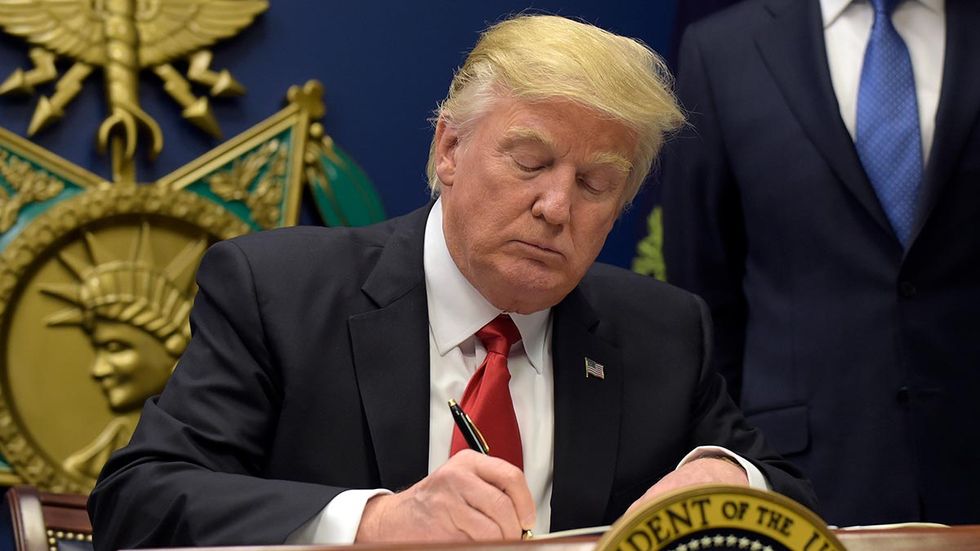
© 2024 Blaze Media LLC. All rights reserved.
It didn’t take long for liberals to make a moral, legal, and philosophical equivalent between Trump’s executive order protecting national sovereignty and security and Obama’s executive amnesty shredding Congress’ plenary power over immigration.
The arguments go something like this:
Well, why was it a problem when Obama took executive action on immigration and not Trump?
If it were OK for a district judge to put a restraining order on Obama’s executive amnesty, why can’t a district judge put an injunction on Trump’s?
The answer is very simple: statute, the Constitution, and national sovereignty. It’s a difference between night and day.
Trump is trying to do the job the Constitution and Congress have authorized him to perform
Rooted in our history and tradition, our immigration laws are — generally speaking — written to give the president broad authority to ratchet down immigration as needed, not to ratchet it up without a full debate in Congress over such a proposition.
Consent-based immigration is rooted in the notion, “governance by the consent of the governed” — that through their elected representatives, the people have control over who comes into the country.
As we’ve noted before, Congress rightfully delegated restrictionist authority to the president under section 212(f) of the Immigration and Nationality Act in the clearest terms imaginable. That should end the discussion.
Moreover, almost each component of the immigration order is double covered by another statute. Under existing law unanimously passed by Congress (8 U.S. Code § 1735), any foreign national from state sponsors of terror (at the time of the original law in 2002, that included five of the seven countries on Trump’s list) are not to be granted visas forever (not just for 90 days, as Trump has proposed).
George W. Bush and Obama utilized waiver authority to bring in these people; Trump merely reinstated the base statute.
Plus, Trump added Somalia and Yemen, which are even worse than state sponsors of terror; they are failed terror state safe havens with absolutely no data on immigrants. It would be a violation of the social compact for a president to allow immigration from those countries.
Trump has the statutory authority to do what he did. Period.
Trump can stop refugees via executive war powers authority
In addition to Article I, Section 8, Clause 4 of the Constitution and unanimous case law since our Founding that give Congress plenary power over immigration and the authority to delegate power to the executive specifically to ratchet down (again, not up) immigration, the president also has war powers to shut off immigration.[1]
We have been engaged in conflict in Somalia, Yemen, and many of these countries and have ongoing military operations in Iraq, Syria, and Libya. In fact, throughout our history, we have never admitted immigrants in such large quantities from nations that were the subject of ongoing wars. Yet judges are mandating we take them in!
As for refugees, the president was specifically given the power to set the cap and criteria for who is let in as a refugee (more so than any other area of immigration) under 8 U.S.C. 1157. The notion that a president can’t place a moratorium on refugees (in this case, from any country, not just Muslim-majority ones) until we have a better vetting system in place, defies comprehension.
Most egregiously, Judge James Robart — who should be impeached — said that Trump’s prioritization of persecuted religious minorities is unconstitutional(!!), even though it is literally required by current law and the entire spirit of refugee status in the first place. From Section 8 U.S.C. 1101(a)(42)(A):
The term “refugee” means (A) any person who is outside any country of such person’s nationality … and who is unable or unwilling to return to … that country because of persecution or a well-founded fear of persecution on account of … religion [among other things] …[.]
And as I’ve noted before, Democrats have long used the “Lautenberg Amendment” to extract Jews from the former Soviet Union and Iran in a very strict, religious litmus test.
Now contrast Trump’s act of following the spirit and letter of the law, protecting American security, and preserving American sovereignty with Obama’s unilateral nullification of immigration law. Not only did Obama violate section 1225(b)(2)(A) of the INA, which requires ICE agents to place all illegal aliens into removal proceedings, but he also created his own immigration program and offered positive benefits to people here against the national will: He offered them affirmative legal status with Social Security cards, work permits, and thousands of dollars in refundable tax credit welfare payments.
As I’ve said before, giving rights to aliens is the quintessential example Hamilton used to contrast a president from a king. “[T]he one [a president] can confer no privileges whatever; the other [a king] can make denizens of aliens, noblemen of commoners; can erect corporations with all the rights incident to corporate bodies,” wrote Hamilton in Federalist #69.
Now the courts are also acting like a king — making denizens out of aliens, just like Obama did. Trump is using delegated authority to not make denizens out of aliens. Whether or not you favor mass migration from Somalia is a matter of policy prudence, but not subject to legal dispute.
Thus, when Judge Andrew Hanen issued a temporary restraining order against Obama’s amnesty (following by a permanent injunction) in a 123-page scholarly opinion, he was following the law and the Constitution, unlike Judge Robart.
To be clear, I personally agree that a district judge should not be able to issue a nationwide injunction (outside the court’s jurisdiction) on national policy, and at the time I was consistent in my warning to Republicans that they use Congress — not the courts — to fight Obama. Either way, the reason why Obama’s amnesty was unconstitutional is because it violated statute, not just because Judge Hanen said so.
On the other hand, Trump followed statute, yet Judge Robart gave no explanation for throwing out settled law or why the plaintiffs would succeed on the merits before issuing his restraining order.
Perforce, in either case, judges aren’t the law of the land. The laws duly passed by Congress pursuant to our Constitution, history, and tradition are the laws of the land. Trump followed them; Obama nullified them in a way even King George couldn’t do.
The bottom line is that the only hypocrisy on this issue is coming from the Left because it doesn’t like the history, traditions, and laws of our immigration system. It’s fine for the Left to complain about our laws. It’s not OK to change them through the president or the courts without approval from Congress. Trump, on the other hand, is applying the existing law. It’s time for liberals to learn how to read.
[1] Chae Chan Ping v. United States, 130 U. S. 604-609 (1889). Congress also has the authority under other clauses of the Constitution; Nishimura Ekiu v. United States 142 U.S. 651, 659 (1892) [“In the United States, this power is vested in the national government, to which the Constitution has committed the entire control of international relations, in peace as well as in war. It belongs to the political department of the government, and may be exercised either through treaties made by the President and Senate or through statutes enacted by Congress, upon whom the Constitution has conferred power to regulate commerce with foreign nations, including the entrance of ships, the importation of goods, and the bringing of persons into the ports of the United States; to establish a uniform rule of naturalization; to declare war, and to provide and maintain armies and navies, and to make all laws which may be necessary and proper for carrying into effect these powers and all other powers vested by the Constitution in the government of the United States, or in any department or officer thereof.”]
Want to leave a tip?
We answer to you. Help keep our content free of advertisers and big tech censorship by leaving a tip today.
Want to join the conversation?
Already a subscriber?
Blaze Podcast Host
Daniel Horowitz is the host of “Conservative Review with Daniel Horowitz” and a senior editor for Blaze News.
RMConservative
more stories
Sign up for the Blaze newsletter
By signing up, you agree to our Privacy Policy and Terms of Use, and agree to receive content that may sometimes include advertisements. You may opt out at any time.
© 2024 Blaze Media LLC. All rights reserved.
Get the stories that matter most delivered directly to your inbox.
By signing up, you agree to our Privacy Policy and Terms of Use, and agree to receive content that may sometimes include advertisements. You may opt out at any time.



